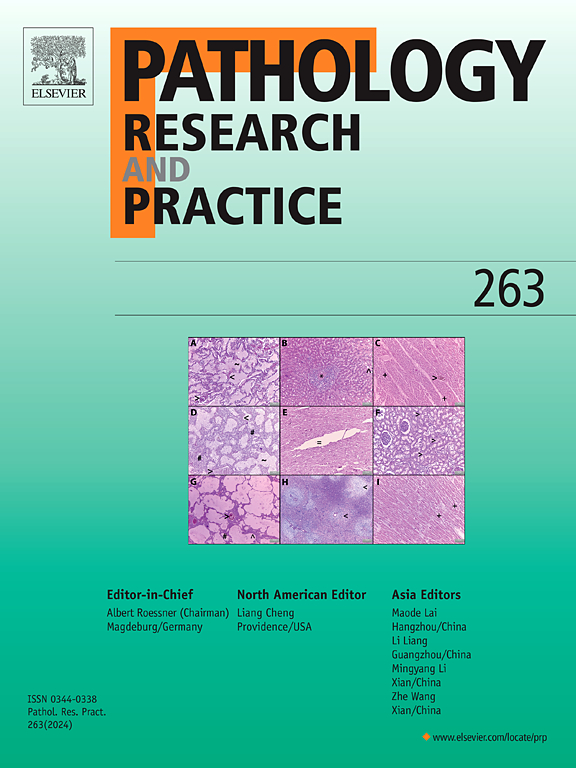Utility of peritoneal fluid for multiplexed mRNA profiling of peritoneal metastasis from pancreatic cancer
IF 3.2
4区 医学
Q2 PATHOLOGY
引用次数: 0
Abstract
Background
Patients with peritoneal metastasis (PM) have poor survival rates, and few methods for prognostic stratification of patients with proven PM exist. Peritoneal fluid (PF) provides a direct reflection of the microenvironment of the peritoneal cavity, and transcriptomic profiling of PF represents a novel and potentially clinically valuable approach that warrants investigation. We aimed to evaluate the utility of formalin-fixed paraffin embedded (FFPE) PF sediments left over after conventional peritoneal cytology diagnosis for multiplexed mRNA expression profiling and to identify dysregulated mRNAs in PM vs. controls. Furthermore, we explored whether certain mRNAs upregulated in PM hold prognostic value.
Methods
Samples included were FFPE sediments of malignant PFs from cases of PM from pancreatic cancer (PM-PC, n = 19) scheduled for pressurized intraperitoneal aerosol chemotherapy (PIPAC) and benign ascites (controls, n = 16). RNA was extracted from the FFPE sediments. Expression profiling of 760 cancer-related mRNAs was performed, followed by unsupervised clustering, differential gene expression analysis, ROC/AUC analysis, generation of KM plots, and Cox proportional hazards regression. Cellular expression of proteins encoded by selected dysregulated mRNAs was analyzed using immunocytochemistry.
Results
In PF sediments with malignant cells, 56 upregulated and 130 downregulated mRNAs were identified. Selected up- and downregulated mRNAs were similarly dysregulated at the protein level. Upregulation of six mRNAs (ESRP2, EPCAM, SFN, ITGB6, ESRP1, and GRHL2) was associated with short-term survival (P < 0.0025).
Conclusion
Our data indicate that PF from PM-PC patients is suitable for transcriptomic analysis. Numerous upregulated mRNAs known to play a role in tumour progression were identified. Our data indicate that mRNA profiling may be a clinically useful tool for further prognostic stratification of patients with proven PM, but larger studies are needed to validate our findings.
利用腹膜液对胰腺癌腹膜转移的多重mRNA谱分析。
背景:腹膜转移(PM)患者的生存率很低,目前对已证实的PM患者进行预后分层的方法很少。腹膜液(PF)提供了腹膜腔微环境的直接反映,而PF的转录组学分析代表了一种值得研究的新颖且具有潜在临床价值的方法。我们的目的是评估常规腹膜细胞学诊断后遗留的福尔马林固定石蜡包埋(FFPE) PF沉积物的多重mRNA表达谱的用途,并识别PM与对照组中失调的mRNA。此外,我们探讨了在PM中上调的某些mrna是否具有预后价值。方法:样本包括计划进行压力腹腔喷雾化疗(PIPAC)的胰腺癌PM (PM- pc, n = 19)和良性腹水(对照组,n = 16)的恶性PFs的FFPE沉淀物。从FFPE沉积物中提取RNA。对760种癌症相关mrna进行表达谱分析,随后进行无监督聚类、差异基因表达分析、ROC/AUC分析、生成KM图和Cox比例风险回归。通过免疫细胞化学分析选定的失调mrna编码的蛋白的细胞表达。结果:在恶性细胞的PF沉积物中,鉴定出56个上调mrna和130个下调mrna。选择的上调和下调mrna在蛋白质水平上同样失调。6种mrna (ESRP2、EPCAM、SFN、ITGB6、ESRP1和GRHL2)的上调与短期生存相关(P )结论:我们的数据表明PM-PC患者的PF适合转录组学分析。确定了许多已知在肿瘤进展中起作用的上调mrna。我们的数据表明,mRNA谱分析可能是一种临床有用的工具,可以进一步对确诊的PM患者进行预后分层,但需要更大规模的研究来验证我们的发现。
本文章由计算机程序翻译,如有差异,请以英文原文为准。
求助全文
约1分钟内获得全文
求助全文
来源期刊
CiteScore
5.00
自引率
3.60%
发文量
405
审稿时长
24 days
期刊介绍:
Pathology, Research and Practice provides accessible coverage of the most recent developments across the entire field of pathology: Reviews focus on recent progress in pathology, while Comments look at interesting current problems and at hypotheses for future developments in pathology. Original Papers present novel findings on all aspects of general, anatomic and molecular pathology. Rapid Communications inform readers on preliminary findings that may be relevant for further studies and need to be communicated quickly. Teaching Cases look at new aspects or special diagnostic problems of diseases and at case reports relevant for the pathologist''s practice.

 求助内容:
求助内容: 应助结果提醒方式:
应助结果提醒方式:


